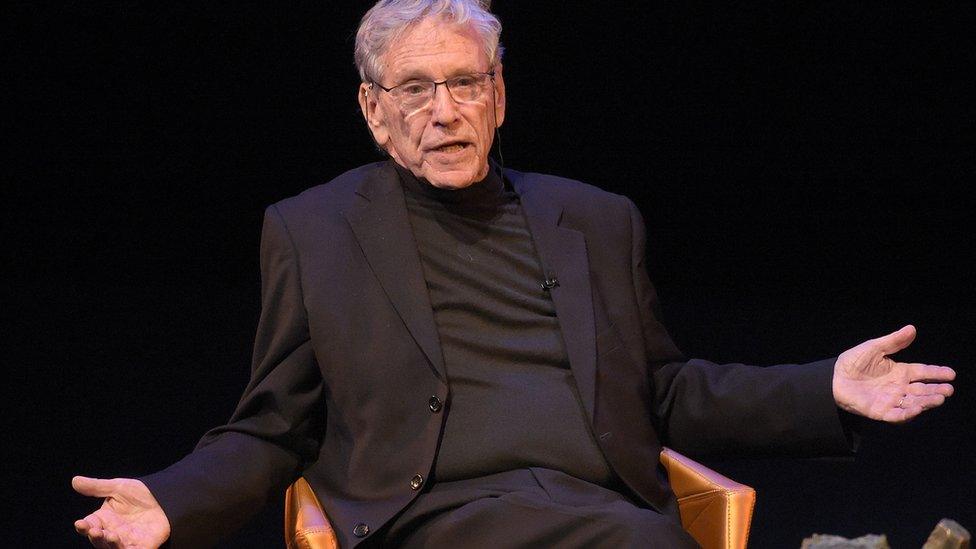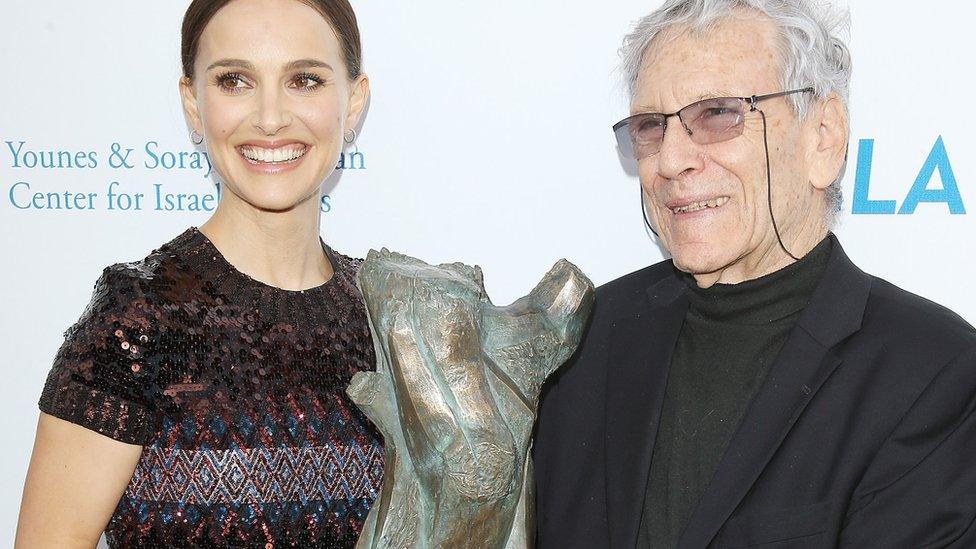Amos Oz: Acclaimed Israeli author dies at 79
- Published

Oz's novels were translated into more than 40 languages
Amos Oz, the leading Israeli author and a prominent advocate for peace between Israel and the Palestinians, has died of cancer at the age of 79.
His most acclaimed works included the best-selling 2002 autobiographical novel A Tale of Love and Darkness.
It was adapted for the big screen in 2015, directed by Natalie Portman.
Early support for a two-state solution to the Israel-Palestinian conflict led some to brand Oz a traitor - which he said he wore as "a badge of honour".
The news of his death was announced by his daughter, historian Fania Oz-Salzberger.
"My beloved father passed away from cancer, just now, after a rapid deterioration, when he was sleeping at peace, surrounded by the people who love him," she wrote on Twitter, external.
"Please respect our privacy. I will not be able to comment. Thank you to those who loved him."

Oz's novel A Tale of Love and Darkness was adapted for the big screen, directed by and starring Natalie Portman
Oz was one of Israel's most widely-read and best-known writers, winning awards including the Israel Prize, the German Heinrich Heine prize, the French Legion d'Honeur and a membership of the American Academy of Arts and Sciences.
His books have been translated into 45 languages and he was often tipped as a candidate for the Nobel Prize for Literature.
He was born Amos Klausner in Jerusalem in 1939, and the city would provide a canvas for many of his works. His breakthrough novel, 1968's My Michael, was written while he worked in a kibbutz and describes the love and marriage of a young woman against the background of 1950s Jerusalem.
Referring to A Tale of Love and Darkness, Israeli President Reuven Rivlin said: "It was a tale of love and light, and now, a great darkness.
"Rest in peace, dear Amos. You gave us great pleasure."
BBC News producer Gidi Kleiman said the author was "a voice for liberal Israel and the search for peace with the Palestinians".
Allow X content?
This article contains content provided by X. We ask for your permission before anything is loaded, as they may be using cookies and other technologies. You may want to read X’s cookie policy, external and privacy policy, external before accepting. To view this content choose ‘accept and continue’.
Author and journalist Jonathan Freedland added that Oz was "a guiding light to all those who longed for a just Israel, living in peace with its neighbours".
Allow X content?
This article contains content provided by X. We ask for your permission before anything is loaded, as they may be using cookies and other technologies. You may want to read X’s cookie policy, external and privacy policy, external before accepting. To view this content choose ‘accept and continue’.
He was a longstanding advocate of the creation of a Palestinian state and in a 1996 interview said the only way to find peace was by establishing two states through "painful compromise".
He said: "We need to divide it. We need to work out a mutually acceptable compromise."
Speaking to BBC Two's Newsnight in 2016 about the reaction to his views in his home country, he said: "I've been called a traitor many times in my life. I think I'm in wonderful company.
"History is full of people, men and women, who happened to be ahead of their time and were accused of treason by some of their contemporaries."
Allow YouTube content?
This article contains content provided by Google YouTube. We ask for your permission before anything is loaded, as they may be using cookies and other technologies. You may want to read Google’s cookie policy, external and privacy policy, external before accepting. To view this content choose ‘accept and continue’.
In recent years, Oz spoke out against the policies of Israeli Prime Minister Benjamin Netanyahu, shunning official Israeli functions abroad in protest at what he called the "growing extremism" of his country's government.
"I can tell you where I draw the line," he told Newsnight. "If people call Israel nasty, I - to some degree - agree. If they called Israel the devil incarnate, I think they are obsessed, I think they are mad, but this is still legitimate.
"But if they carry on saying there should be no Israel, that's where anti-Zionism becomes anti-Semitism."
Israeli foreign ministry spokesman Emmanuel Nahshon called Oz's death, external "a loss for us all and for the world".